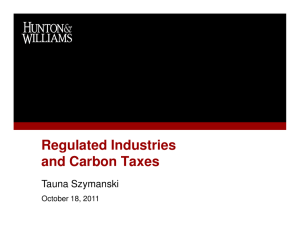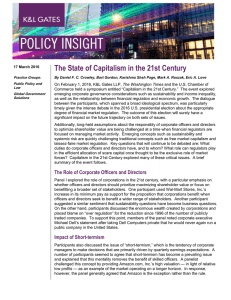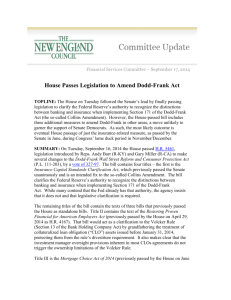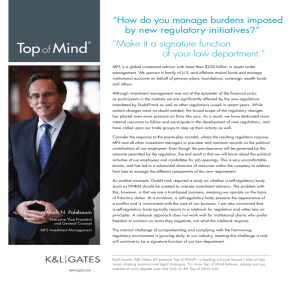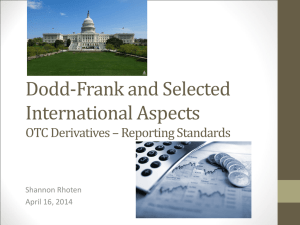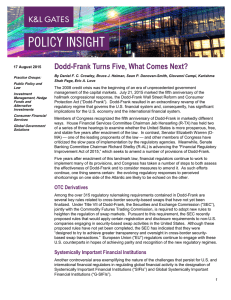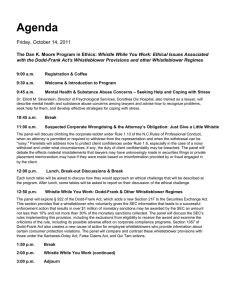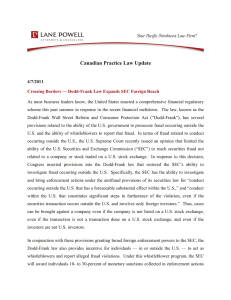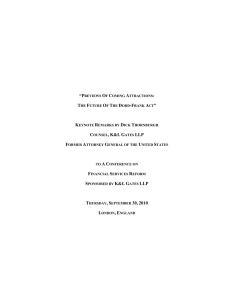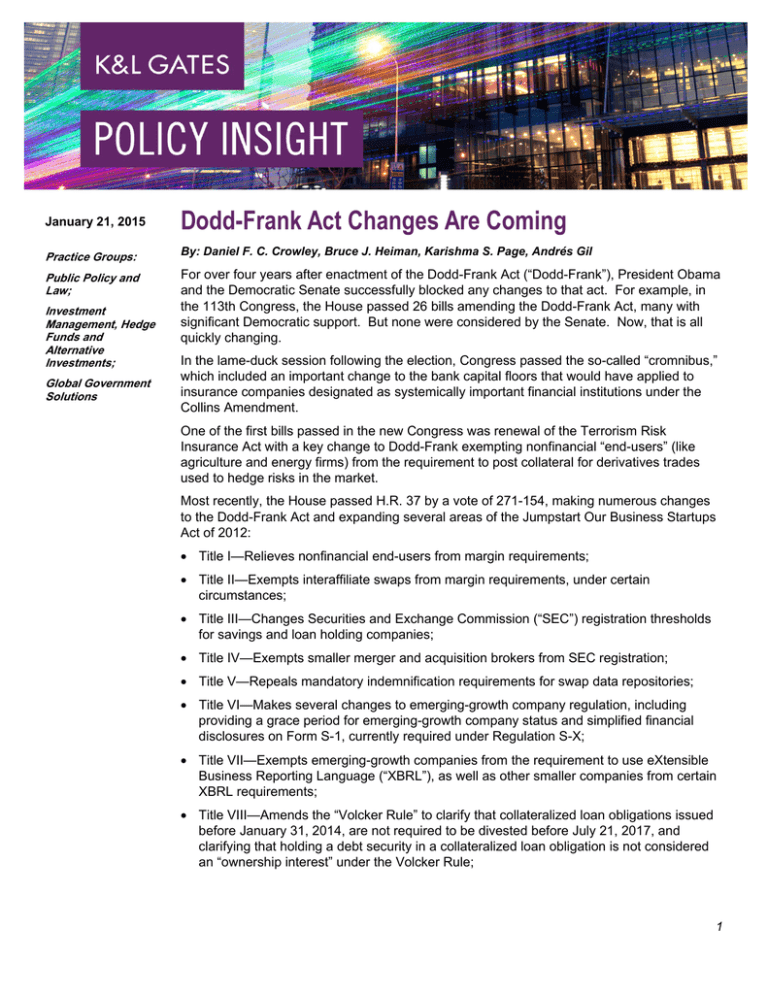
January 21, 2015
Dodd-Frank Act Changes Are Coming
Practice Groups:
By: Daniel F. C. Crowley, Bruce J. Heiman, Karishma S. Page, Andrés Gil
Public Policy and
Law;
For over four years after enactment of the Dodd-Frank Act (“Dodd-Frank”), President Obama
and the Democratic Senate successfully blocked any changes to that act. For example, in
the 113th Congress, the House passed 26 bills amending the Dodd-Frank Act, many with
significant Democratic support. But none were considered by the Senate. Now, that is all
quickly changing.
Investment
Management, Hedge
Funds and
Alternative
Investments;
Global Government
Solutions
In the lame-duck session following the election, Congress passed the so-called “cromnibus,”
which included an important change to the bank capital floors that would have applied to
insurance companies designated as systemically important financial institutions under the
Collins Amendment.
One of the first bills passed in the new Congress was renewal of the Terrorism Risk
Insurance Act with a key change to Dodd-Frank exempting nonfinancial “end-users” (like
agriculture and energy firms) from the requirement to post collateral for derivatives trades
used to hedge risks in the market.
Most recently, the House passed H.R. 37 by a vote of 271-154, making numerous changes
to the Dodd-Frank Act and expanding several areas of the Jumpstart Our Business Startups
Act of 2012:
• Title I—Relieves nonfinancial end-users from margin requirements;
• Title II—Exempts interaffiliate swaps from margin requirements, under certain
circumstances;
• Title III—Changes Securities and Exchange Commission (“SEC”) registration thresholds
for savings and loan holding companies;
• Title IV—Exempts smaller merger and acquisition brokers from SEC registration;
• Title V—Repeals mandatory indemnification requirements for swap data repositories;
• Title VI—Makes several changes to emerging-growth company regulation, including
providing a grace period for emerging-growth company status and simplified financial
disclosures on Form S-1, currently required under Regulation S-X;
• Title VII—Exempts emerging-growth companies from the requirement to use eXtensible
Business Reporting Language (“XBRL”), as well as other smaller companies from certain
XBRL requirements;
• Title VIII—Amends the “Volcker Rule” to clarify that collateralized loan obligations issued
before January 31, 2014, are not required to be divested before July 21, 2017, and
clarifying that holding a debt security in a collateralized loan obligation is not considered
an “ownership interest” under the Volcker Rule;
1
Dodd-Frank Act Changes Are Coming
• Title IX—Exempts certain advisers to small business investment companies (“SBICs”)
from SEC registration requirements with respect to the provision of investment advice
relating to venture capital funds and registration and reporting requirements regarding
assets under management of private funds and advisers to assets under management of
private funds with respect to certain registration and reporting requirements;
• Title X—Simplifies Form 10-K with a summary page and requires simplification and a
study of Regulation S-K.
Note that while many of these changes continue to have substantial Democratic support, the
change to the Volcker Rule that would eliminate the required divestment of certain
collateralized loan obligations by banking entities has been controversial among Democrats;
indeed, its inclusion is responsible for most Democrats voting against the bill.
The bill now goes to the Senate, where it is likely to pass under new Republican control.
That may well draw a veto from President Obama. Under pressure from Senator Elizabeth
Warren and other liberals, including former Senator Hillary Clinton, President Obama has
increasingly taken a tough line on changes to Dodd-Frank.
If the bill is vetoed, congressional Republicans could either: (1) seek to attach the bill to other
“must pass” legislation the President would be reluctant to veto (i.e., the strategy employed
with the cromnibus bill last December); or (2) they could pass the bill without the
controversial Volcker Rule amendment, increasing the chances that the bill would be signed
by the President.
Despite the White House’s opposition to any legislation that would weaken key consumer
protections and provisions of Dodd-Frank, changes are already being made. We expect that
other issues, including Consumer Financial Protection Bureau disclosure and lending rules,
bank capital requirements, and systemic risk regulation will also be included in future
financial regulatory reform bills in this Congress.
Authors:
Daniel F. C. Crowley
dan.crowley@klgates.com
+1.202.778.9447
Bruce J. Heiman
bruce.heiman@klgates.com
+1.202.661.3935
Karishma S. Page
karishma.page@klgates.com
+1.202.778.9128
Andrés Gil
andres.gil@klgates.com
+1.202.778.9226
2
Dodd-Frank Act Changes Are Coming
Anchorage Austin Beijing Berlin Boston Brisbane Brussels Charleston Charlotte Chicago Dallas Doha Dubai Fort Worth Frankfurt
Harrisburg Hong Kong Houston London Los Angeles Melbourne Miami Milan Moscow Newark New York Orange County Palo Alto Paris
Perth Pittsburgh Portland Raleigh Research Triangle Park San Francisco São Paulo Seattle Seoul Shanghai Singapore Spokane
Sydney Taipei Tokyo Warsaw Washington, D.C. Wilmington
K&L Gates comprises more than 2,000 lawyers globally who practice in fully integrated offices located on five
continents. The firm represents leading multinational corporations, growth and middle-market companies, capital
markets participants and entrepreneurs in every major industry group as well as public sector entities, educational
institutions, philanthropic organizations and individuals. For more information about K&L Gates or its locations,
practices and registrations, visit www.klgates.com.
This publication is for informational purposes and does not contain or convey legal advice. The information herein should not be used or relied upon in
regard to any particular facts or circumstances without first consulting a lawyer.
© 2015 K&L Gates LLP. All Rights Reserved.
3


